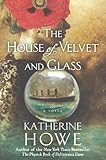 Katherine Howe’s debut novel, [amazon asin=B003WUYROK&text=The Physick Book of Deliverance Dane], concerned a setting near her home in Marblehead and the Salem Witch Trials of 1692. Howe returns once again to Massachusetts of an earlier era, this time pre-WWI Boston. Sibyl Allston, daughter of a wealthy Salem sailor and a society gal, has lost her mother and younger sister in the sinking of Titanic. Her mother introduced her to the spiritualist gatherings at the home of the medium Mrs. Dee, and Sibyl continues to go in a desperate attempt to contact her mother and sister from beyond the grave. Discouraged by her inability to connect, she accepts a scrying glass from Mrs. Dee, and at first, she finds her attempts to use it unsuccessful, too. Her brother, sent home from Harvard in disgrace after he is caught in flagrante delicto with an actress in his rooms, brings his flamboyant girlfriend Dovie home, where she and Sibyl become unlikely friends. Dovie takes Sibyl to an opium den, where Sibyl is able to use her scrying glass for the first time. At first, she sees snatches of images she doesn’t understand, but once she realizes what she is able to see, Sibyl becomes desperate to know if what she sees in the scrying glass can be changed. The narrative is interspersed with flashbacks to her seventeen-year-old father’s sailing voyage to Shanghai and friendship with a young Chinese scholar and her mother and sister’s voyage on Titanic.
Katherine Howe’s debut novel, [amazon asin=B003WUYROK&text=The Physick Book of Deliverance Dane], concerned a setting near her home in Marblehead and the Salem Witch Trials of 1692. Howe returns once again to Massachusetts of an earlier era, this time pre-WWI Boston. Sibyl Allston, daughter of a wealthy Salem sailor and a society gal, has lost her mother and younger sister in the sinking of Titanic. Her mother introduced her to the spiritualist gatherings at the home of the medium Mrs. Dee, and Sibyl continues to go in a desperate attempt to contact her mother and sister from beyond the grave. Discouraged by her inability to connect, she accepts a scrying glass from Mrs. Dee, and at first, she finds her attempts to use it unsuccessful, too. Her brother, sent home from Harvard in disgrace after he is caught in flagrante delicto with an actress in his rooms, brings his flamboyant girlfriend Dovie home, where she and Sibyl become unlikely friends. Dovie takes Sibyl to an opium den, where Sibyl is able to use her scrying glass for the first time. At first, she sees snatches of images she doesn’t understand, but once she realizes what she is able to see, Sibyl becomes desperate to know if what she sees in the scrying glass can be changed. The narrative is interspersed with flashbacks to her seventeen-year-old father’s sailing voyage to Shanghai and friendship with a young Chinese scholar and her mother and sister’s voyage on Titanic.
This book took me a while to get into, but about halfway into the book, the pace started picking up. Throughout, the descriptions are gorgeous, and I admired Howe’s ability to capture the early twentieth century well on many occasions. I liked the characters, and the setting was intriguing. The book has interesting things to say about all the what-ifs we wonder about in life, and also what our legacies might be if different choices are made. The old Calvinist thinking of early Massachusetts settlers is a surprising theme of the novel, as well. How much of our lives do we really have control over, and if we try to change events, can we really? Or is so much of what happens to us determined by Fate or God, or whatever you want to call the force of Predestination, that things will happen certain ways whether we try to intervene or not? The book does make one think about one’s place in the grand scheme of things.
Downton Abbey fans might like this book set in the same era in America. I think readers who enjoyed Howe’s first book will like this second one as well, though it is different from the first. Historical fiction fans who enjoy WWI-era novels will like it, too. Be patient with the first half, especially with the flashbacks that might not seem as if they are connected to the main narrative, as you will be rewarded once the book begins to coalesce during the second half. Enjoyable read!
Rating:





